
It trades on the fact that, ten years ago, no one outside the fortress of finance had the time, the will power, or the math to follow the fathomless chicanery that was taking place inside. If you happen to understand credit-default swaps and collateralized debt obligations, or C.D.O.s, you might well enjoy “The Big Short.” If you don’t understand them, however, you’ll have a much better time. Largely, it is greeted with derision, but it piques the interest of Jared Vennett (Ryan Gosling), at Deutsche Bank, a kind of lizard with sideburns, who in turn persuades Mark Baum (Steve Carell), the head of a rancorous hedge fund, to join the game. He decides to bet against it, and word of his gamble spreads. (Bale can be such a chilly actor, but here he plays a chilly man, whose very gait spells bewilderment, and the result is unexpectedly touching.) As early as 2005, Burry has a hunch, grounded in laborious research, that the housing market, famed as a rock of reliability, could soon be washed away. Socially, he makes Steve Jobs look like David Niven. He also possesses a glass eye, an ear for heavy metal, and a busted internal radar. Burry, as if to suggest that he’s still involved in one of the caring professions. He has a medical background, and prefers to be called Dr. Meet Michael Burry (Christian Bale), who works for an investment firm named Scion Capital. This comes up short.Adam McKay’s all-star cast takes on the 2008 financial crisis. The end result is a kind of exhausted acquiescence.

Some people made money more people lost money (but no one we care about). Most exasperatingly, the film appears finally to shrug at the outcome of all this, in a kind of whaddaya-gonna-do grimace, and all those homeless subprime victims are far less important dramatically than sensitive vindicated genius Christian Bale, with the adorable wife he met on. Mark Baum gets a stripper to explain how her dodgy mortgage works, while she’s at work. His character is, incidentally, involved in one of the most outrageous examples of “sexposition” I have ever seen: the practice of getting characters to explain things in a lapdancing club in order to spice up the dialogue. He can’t stop what’s happening he can’t take pleasure in cashing in on its downfall, and even the cashing in part turns out to be frustratingly difficult. Meanwhile Brad Pitt plays Ben Rickert, a broker who has retired from the financial world in disgust, but now helps two newbies to join in this same retributive adventure.Ĭarell himself gives a dull, one-note performance: permanently pissed off, permanently outraged by the rottenness of everything he discovers about the subprime racket, but in a strange, impotent, not-funny way. Ryan Gosling is Jared Vennett, a tough-talking blowhard who gets wind of the deal, grasps the thinking behind it and persuades an investment team to get in on this opportunity – led by Mark Baum, played by Steve Carell, an angry, overheated guy, traumatised by a family tragedy he won’t discuss, and driven by a need to punish the financial world’s iniquities.

He sees that subprimes are about to blow and persuades his boss to gamble the firm’s entire capital on financial instruments that will pay off when the market collapses. There’s a similar tonal problem here.Ĭhristian Bale gives a good performance as Michael Burry, a shy and difficult man employed as a fund manager. “They’re not confessing – they’re bragging!” comes the reply. At one stage, investment brokers cheerfully explain their subprime scam and someone asks how it is they can confess so easily.

There is neither the gleeful energy of Martin Scorsese’s The Wolf of Wall Street nor the plain informative clarity of Charles Ferguson’s documentary Inside Job. The Big Short is fatally unsure about whether it is a righteous condemnation of fraud, or a black comic romp with cool amoral dudes and rebellious outsiders.


 0 kommentar(er)
0 kommentar(er)
